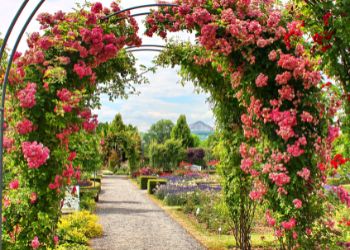As part of taking care of your roses, you want to ensure they’re being planted near friendly plants that will provide them with help and protection. As well as what plants do not sit well beside your roses.
So that’s what I’m going to go over in this post. Starting with what requirements you ideally need out of a rose companion plant. So here’s what to focus on in general for your companion plants.
Choose smaller companion plants for roses, including knockout roses, that hide their bare lower branches. Include plants that attract pollinators, plants that deter pests and diseases, or that complement rose colors, with similar climate requirements, and that do not compete for nutrients and water.
But of course, there’s more to it than just that. For example, you need companion plants, that like roses, want a lot of sunshine, and generally like well-drained soil.
So let’s explore this a little further so you can get the right balance of companion plants in your rosebeds.
Companion plants for roses
It’s difficult to find one single plant that will provide all of these tasks, so mix them up to get a balance.
All of the following companion plant ideas offer something different to help your roses thrive. They can provide needed shade, act as a living mulch to retain moisture, attract pollinators, or give your garden a pop of color.
And I’ve added a handy table further below of the best companion plants that might help – as it looks at what you want to achieve around your roses – be it reducing pests, or plants for hot climates.
Companion plants for roses can be planted anywhere from 6 inches to 3 feet away from the base of your rose bush. When choosing companion plants, make sure to take into account the mature size of both the rose and the companion plant.
Here’s what plants grow best around roses based on what you’re looking to achieve.
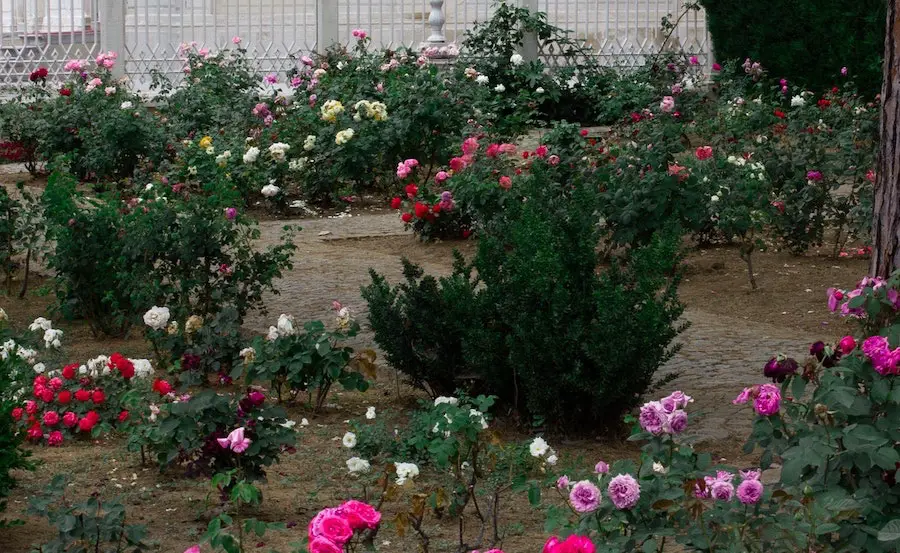
Plants that complement the look of roses
Roses are top-heavy, so beneath that wonderful array of blooms is often a mass of branches and canes. This is perhaps the less attractive side of roses.
To help with this you ideally need companion plants for roses that will be of a similar or lower height so as not to obscure the roses, but which do obscure the leggy branches. But also you do not want to plant other plants too close to your roses as they don’t like to be crowded out.
Plants that flower at the same time, or earlier than the roses so as to provide a long season of color and interest. Preferably plants that bloom for long periods so that they provide some continuous blooms in between rose blooms.
Also, look for plants that have attractive foliage to add texture and contrast throughout the year. You don’t want a plant that is also very leggy and gnarly.
Check out Roses and peonies for another rose companion option.
Plants that don’t compete for water or nutrients
Some plants are good at stealing water from everywhere around them. And this includes invasive plants too. This isn’t just surface water, but also plants that have widespread, and aggressive root structures
For roses, you need plants that won’t take all the resources. Some can be aggressive spreaders, but as long as they don’t compete for water, nutrients, or sunshine they might be okay.
Plants that encourage pollinators
Attracting pollinators to your roses is important to help them produce more flowers and also improve the quality of the flowers.
Look for companion plants that encourage bees, butterflies, and other pollinators.
Plants such as yarrow, lavender, and marjoram are great at attracting pollinators such as honeybees, bumblebees, leafcutter, and furrow bees.
Nasturtiums are another good companion plant for roses, as they attract hoverflies.
Hoverflies are important because their larvae eat aphids. So by attracting them to your garden, you’re helping to keep the aphid population down.
Some plants also have properties that can help to deter pests and rose diseases. For example, garlic is a great companion plant for roses as it helps to deter aphids, Japanese beetles, and rose chafers.
Mints are also good companion plants for roses as they help to deter caterpillars, cabbage white butterflies, and ants.
Check out Roses and gardenias as a rose companion pairing.
Plants that discourage pests and diseases
Companion plants can also help to keep pests and diseases away from your roses. Some companion plants have scents that naturally deter pests.
Not just flowers, but herbs such as chives, or other members of the onion family can be good for roses. They’ll help to keep aphids away.
Plants such as nasturtiums and marigolds release chemicals that deter pests such as aphids, slugs, and snails.
Basil is also a good herb used as a companion plant for roses. It helps to keep mosquitoes away.
Plants that prefer similar growing conditions
If you’re in a colder climate, then you clearly want to be looking at similar climate-related companion plants for roses to complement them. So, pay attention to the growing conditions your rose bushes like, and then find companion plants that have similar needs.
For example, roses need well-drained soil that’s high in organic matter. They also need full sun for at least six hours a day. So, some good companion plants for roses would be herbs like oregano, thyme, as well as lavender. All of these companion plants also like well-drained soil and full sun.
Check out Roses and boxwoods as a backdrop or border for roses.
Plants that offer complementary colors
Roses come in a wide range of colors, from white to yellow to pink to red to purple. So, you have a lot of options when it comes to finding companion plants for roses that will complement their color range and make your garden look even more beautiful.
Some options for companion plants for roses that offer complementary colors include Yarrow (Achillea millefolium) which comes in shades of yellow, pink, and red. Coreopsis (Coreopsis spp.) comes in shades of yellow and red. And Salvia (Salvia spp.) which comes in shades of blue, purple, and white.
Plants that offer similar colors
If you want a more unified look in your garden, you can also choose companion plants for roses that offer similar colors.
Because roses come in lots of different colors you should easily be able to find ones that match the color, as well as provide other complementary aspects.
Check out Roses and peonies for another rose companion plant option.
Rose companion plants – Reference table
Here’s my handy quick reference table for companion plants for roses and the qualities they bring:
| Companion Plants That Will… | Rose Companion Plant Options |
| Attract Pollinators | Lavender, Basil, Bee balm, Zinnia, Alyssum. Marjoram |
| Deter pests and diseases | Yarrow, Basil, Marigold, Daisies, Pansies, Annual phlox, Dianthus, Geranium, Petunias, Angelonia. |
| Add color | Yarrow, Verbena, Bee balm, Pansies, Annual phlox, Zinnia, Geranium, Alyssum. |
| Create ground shade and keep the soil moist | Lavender, Catmint, Sedum, Dianthus, Alyssum. |
| Suppresses weeds | Lavender, Catmint, Dianthus, Alyssum. |
| Thrive in hot climates | Lavender, Yarrow, Sedum, Daisies, Zinnia, Petunias, Angelonia, |
This is not an exhaustive list, and of course, there are lots of crossovers. But hopefully, it gives you a starting point. I’vee written a number of articles on each companion plant that includes some of these as well as others.
18 Great companion plants for roses 🌹
Let’s get into the list of companion plants for roses so you have a little more detail…
1. Lavender
One of the best companion plants for roses is lavender. It’s often first on everyone’s list because it’s a heat-tolerant plant that produces nectar, which attracts bees and other pollinators to your rose garden.
Lavender also has a strong scent that can mix in wonderfully with the fragrance of roses. They are also good for suppressing weeds and won’t steal all the water and nutrients.
I have an entiree article about roses and lavender together as companion plants.
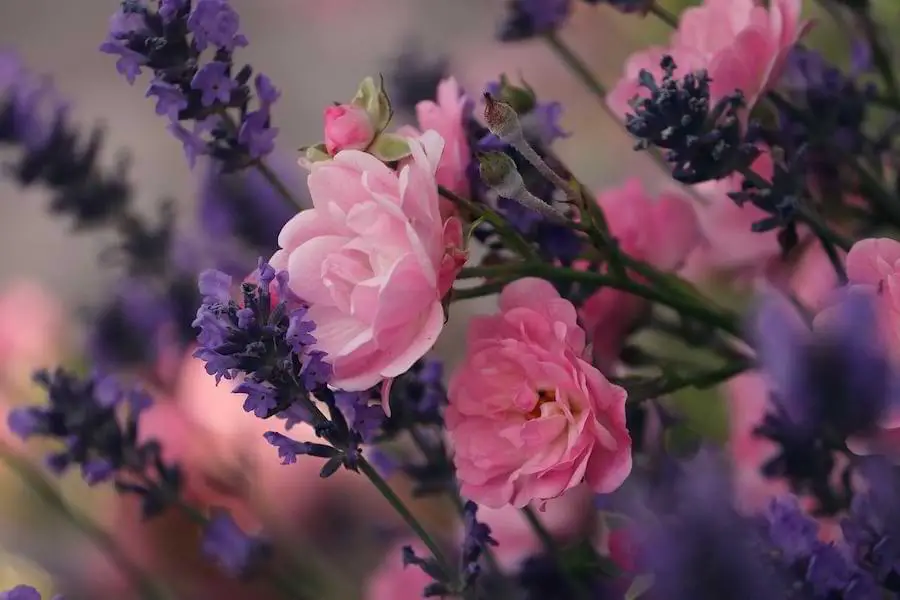
2. Yarrow
Yarrows are a flowering herb that can add some beautiful color to your garden. Yarrow comes in a variety of colors including white, yellow, and pink.
It helps to deter pests. It’s also drought-tolerant, so it’s a good choice for hot, dry climates. But beware as it can also become a little weedy and spreads easily.
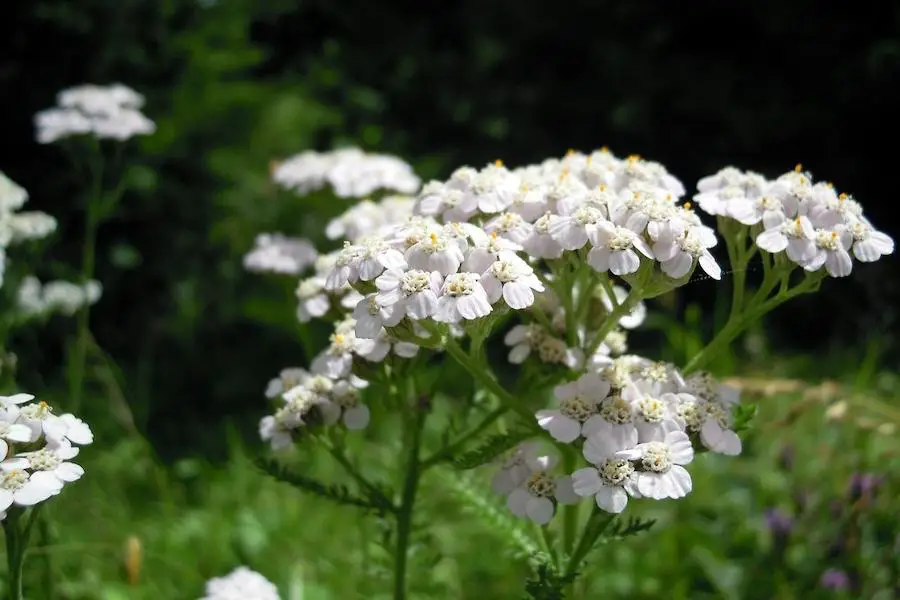
Roses and honeysuckle might be another rose companion plant you want to check out.
3. Catmint
This is good because it’s a perennial that will come back year after year without needing to be replanted. It’s also very low-maintenance and deer resistant.
Catmint also keeps the soil moist for your roses through shading, provides living mulch, and also suppresses weed growth.
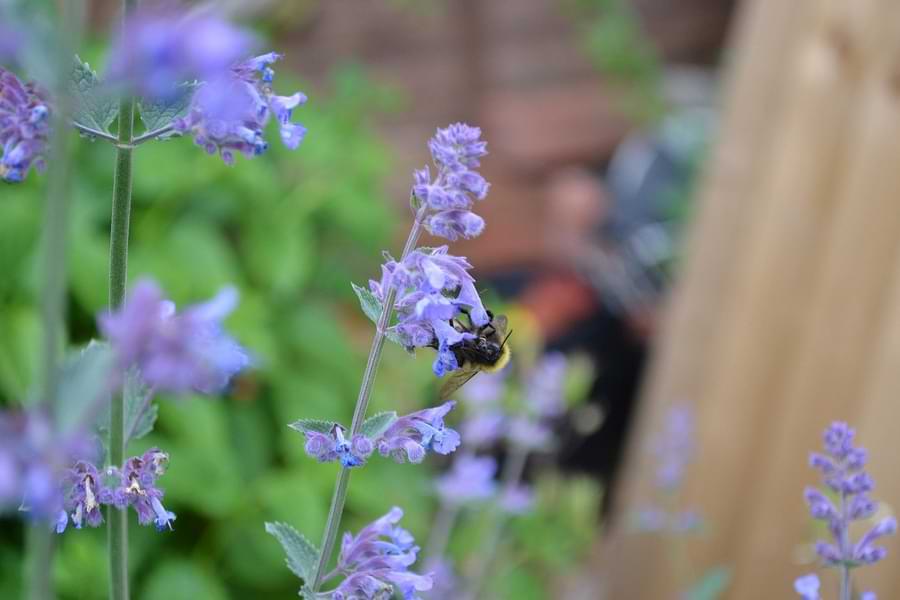
4. Basil
Along with being a great companion plant for roses, basil is also a delicious herb that can be used in cooking.
There are many different varieties of basil, so you can choose the one that best suits your needs. Basil will deter pests and even reduce diseases.
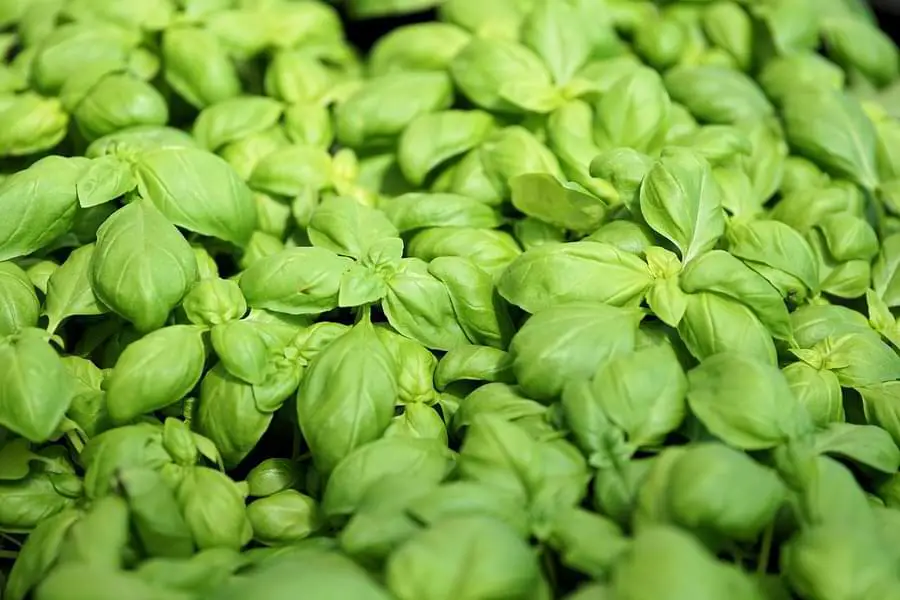
Check out Roses and azaleas together as rose companions
5. Marigolds
These are perhaps the most well-known companion plants for roses (in fact for lots of plants). They’re easy to grow and don’t require a lot of maintenance.
Marigolds are great at keeping away pests. They are low growers too so will help cover the “branchy” part of your rose bush.
I have an article about roses and marigolds as companion plants that you can check for more details.
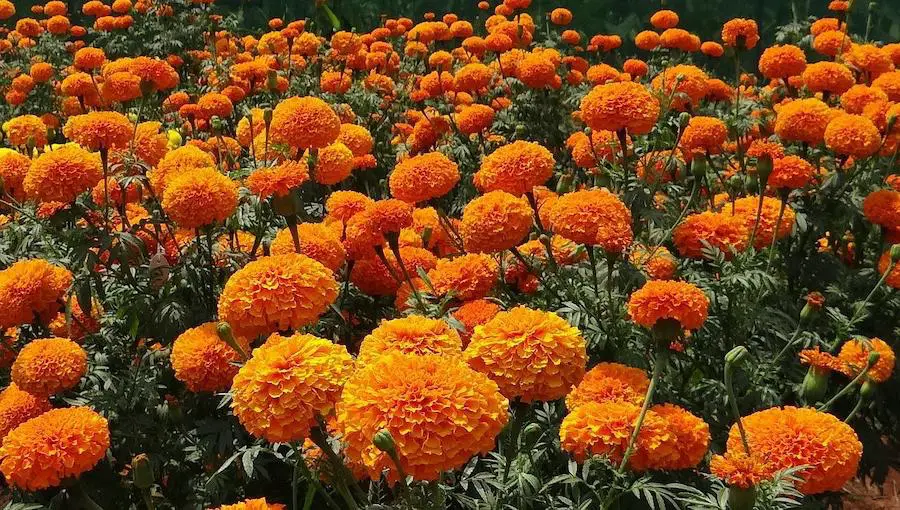
6. Sedum
The sedum plant is a great companion plant for roses because it helps to keep the soil moist. This is especially beneficial in hot, dry climates. They live for a long time and don’t need to be replanted often. There are a number of variations on this plant, so plenty of choices for every rose garden.
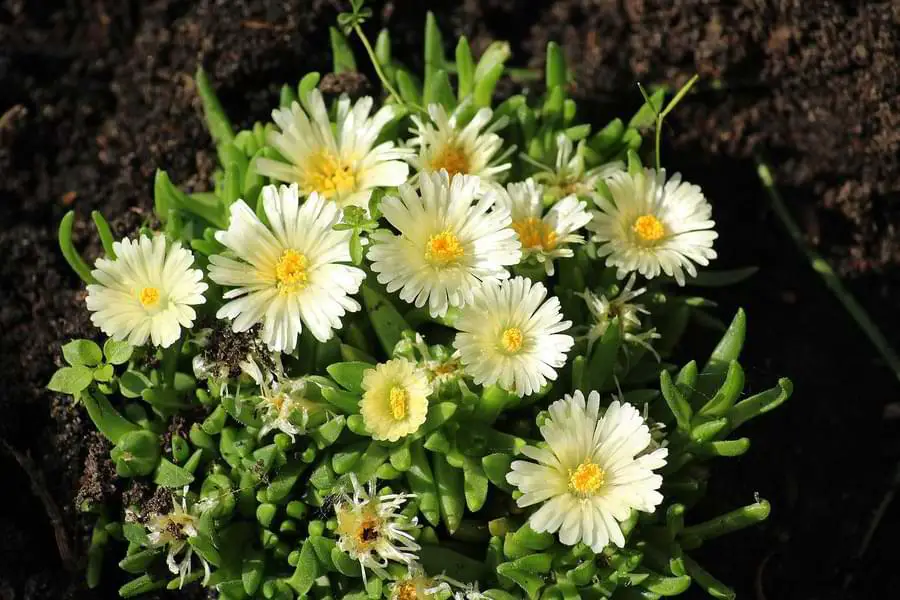
Check out Roses and irises together as a rose companion plant option.
7. Verbena
Choose verbena for a splash of color in your garden. It’s a beautiful companion plant for roses and will add some visual interest to your garden. It’s low, it enjoys lots of sunshine, and will fill the spaces between your roses very effectively.
Verbena is also an old-fashioned flower, which naturally goes well with old garden rose varieties.
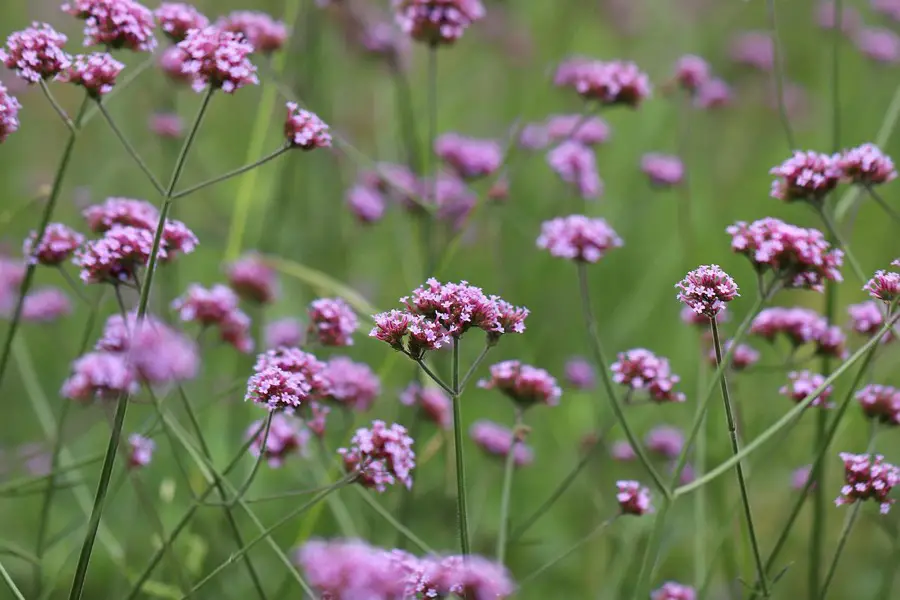
8. Daisies
The family of daisies includes a broad range of plants, from the well-known Shasta daisy to the more unusual heart-leaf globe daisy.
No matter which type you choose, daisies are a great companion plant for roses. They help to keep away pests, attract pollinators, and add a splash color to your garden.
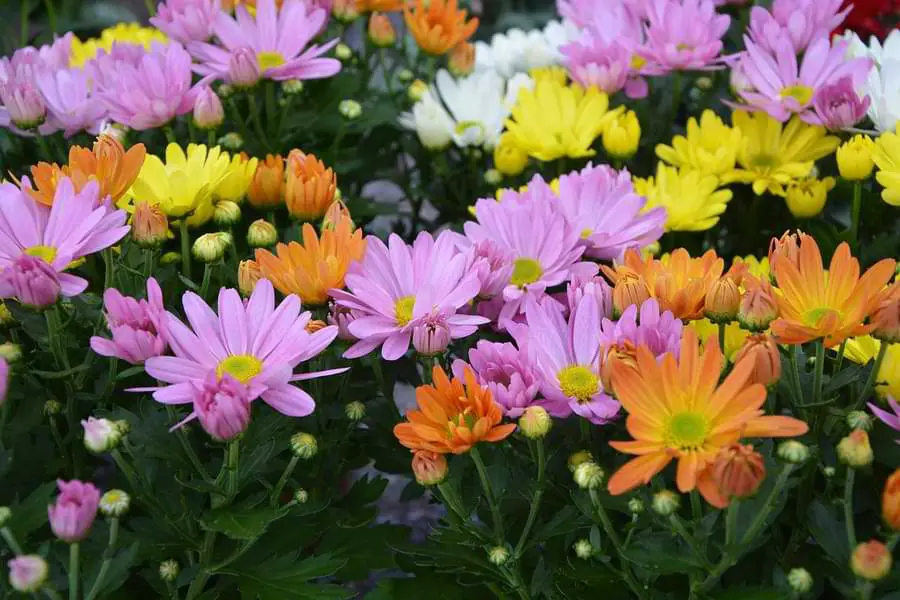
Why not take a look at roses and alliums as companion plants.
9. Bee Balm
For roses, bee balm brings both beauty and function to the garden. The plant is lovely to look at and attracts lots of pollinators, including bees, which are great for pollinating your roses.
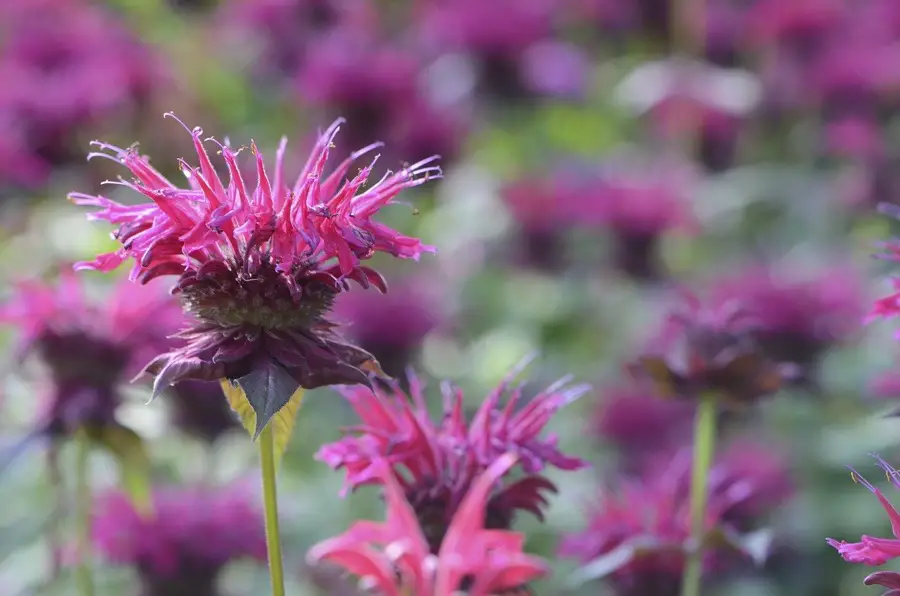
10. Pansies
Those popular plants, pansies are another great companion plant for roses. They add lots of color options, and interest to your garden, and they also help to keep away pests. They are also good for borders, rose containers, and rose beds.
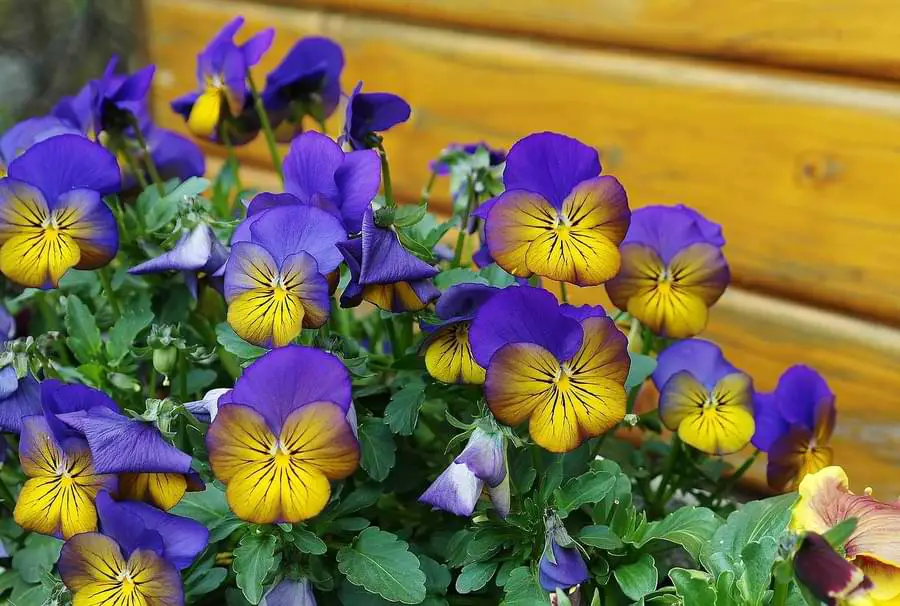
11. Annual phlox
The annual phlox has a similar wonderful array of colors to roses. It’s a low plant, and it blooms early so it can complement the blooms of your roses. It can also help to prevent mildew on roses and add a blast of color to your garden.
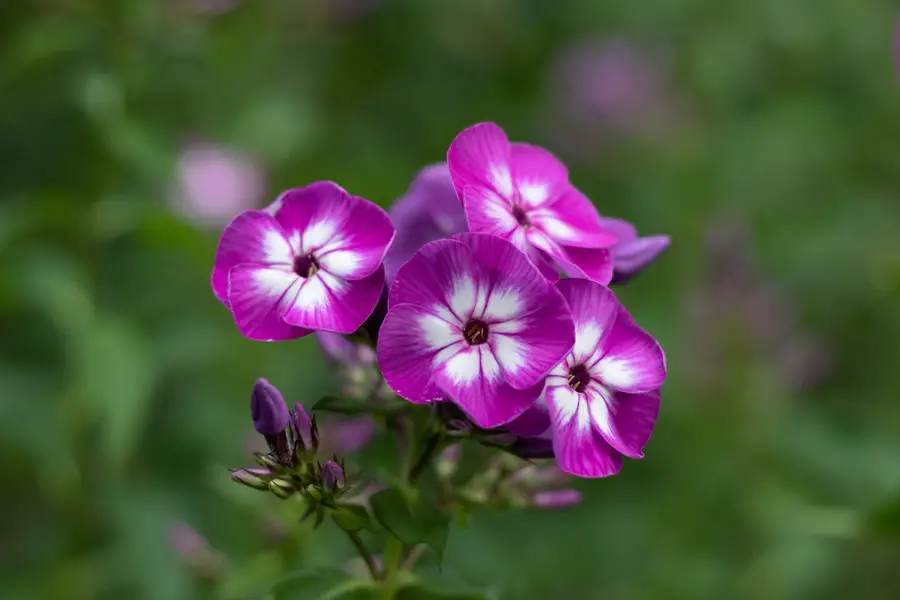
12. Black-eyed Susans
Black-eyed Susans are a daisy variety that is good for roses because they attract pollinators and help to keep away pests. They provide a low plant, with an abundance of colorful and small flowers that can lead nicely upward toward your rose blooms.
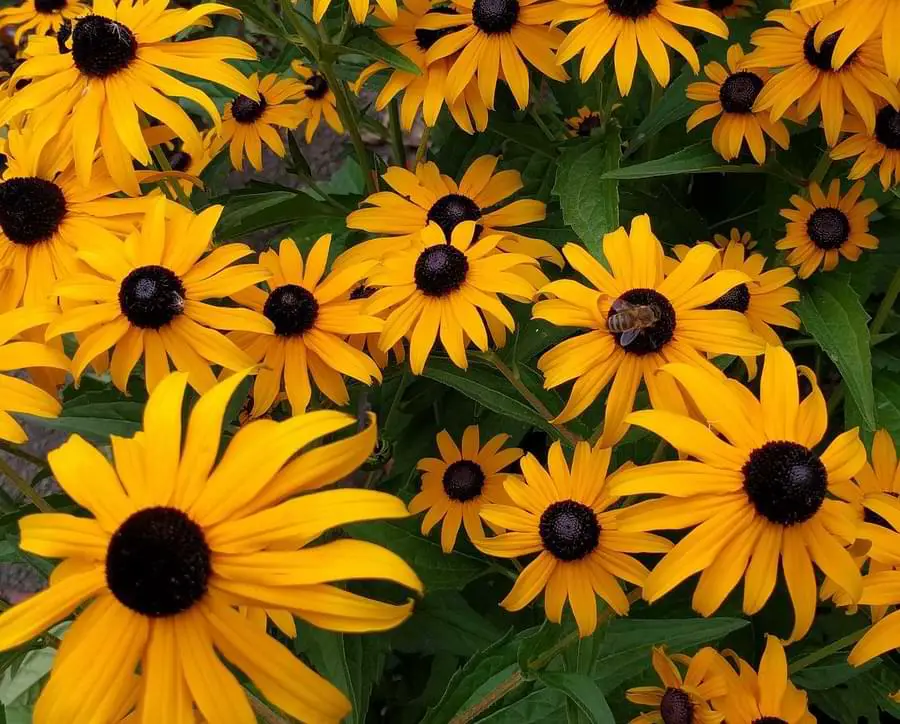
Roses and hydrangeas might be another companion choice to check out.
13. Dianthus
As an old garden flower, Dianthus is a good companion plant for any rose. Especially complementing old garden roses. They suppress weeds, keep the soil shaded and therefore moist, attract pollinators and help to prevent mildew.
It’s also another strong-scented plant. So will mix wonderfully with the aroma of your roses to provide a scent-filled garden.
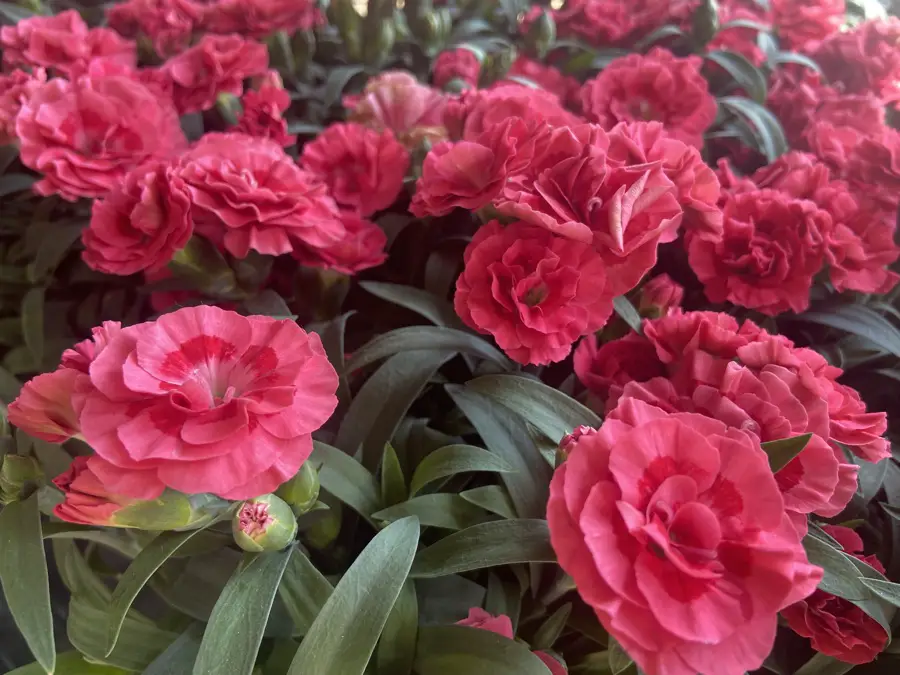
14. Zinnia
Zinnias are great companion plants for roses. They attract pollinators and add an amazing pop of color to your rose beds. They bloom in late summer so will take over the role of your blooming roses. They’re not too tall to overshadow your roses and are perfect for hotter growing zones 7 through 11.
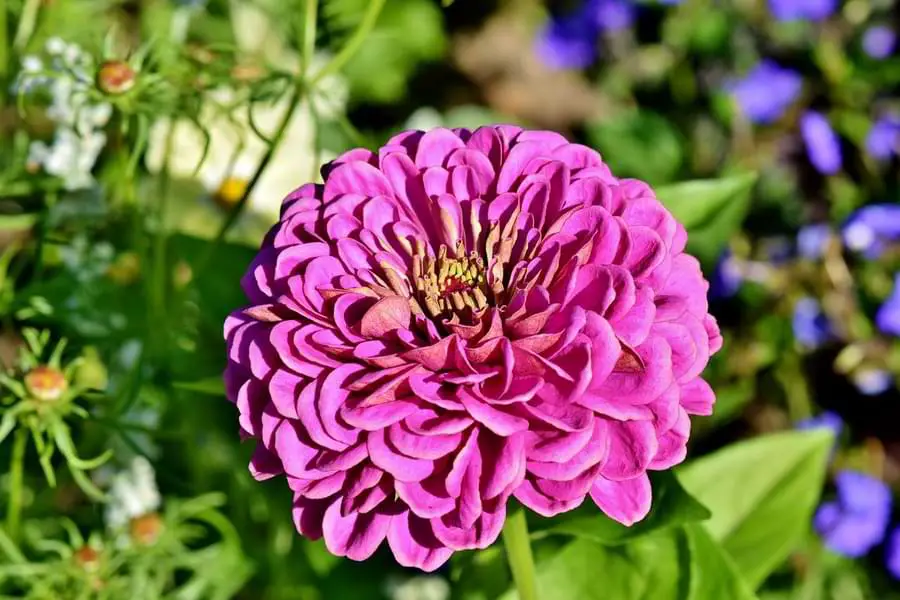
15. Geraniums
The common Geranium is a staple in many gardens, so a familiar plant to use. Geraniums make great companion plants for roses because they can help to keep away diseases such as mildew. They come in a beautiful array of colors and sit very nicely hiding the bare rose branches lower down.
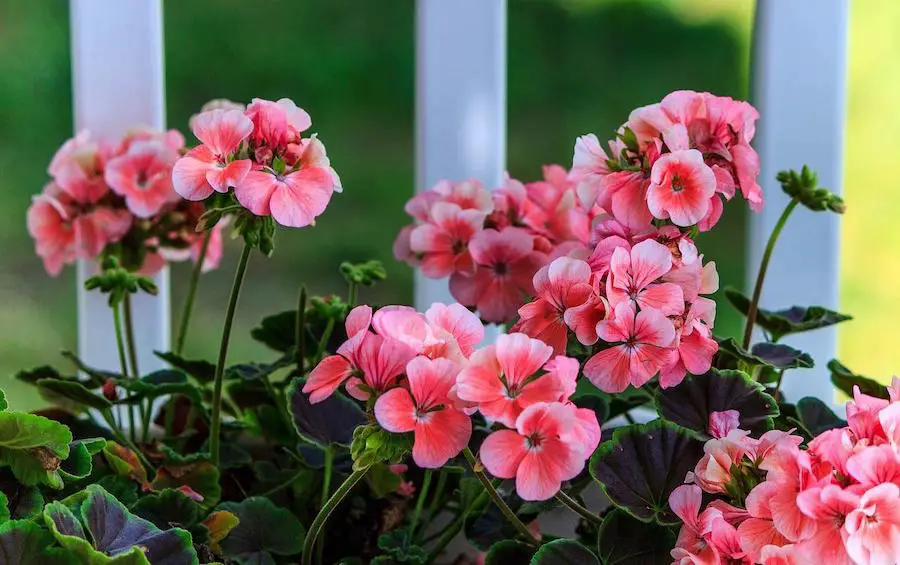
16. Petunias
Choose petunias if you want a plant that will keep away both pests and mildew. they also love the sun and have a wide variety of colors. They will also not steal water or light from your roses.
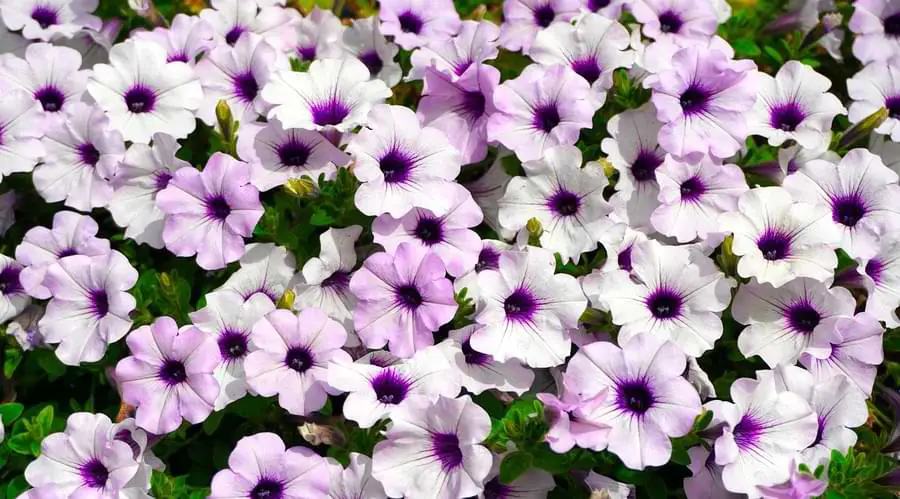
17. Alyssum
The plant alyssum is a great companion plant for roses as it helps to attract bees which can help pollinate your roses. It’s also a low-maintenance plant that doesn’t require a lot of water or care. It’s a low-growing plant and is great for groundcover too.
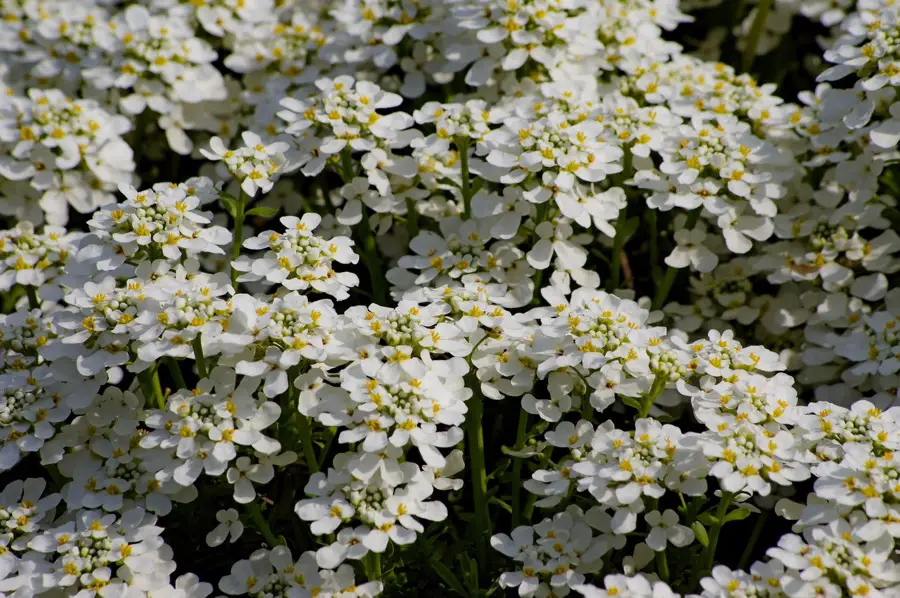
18. Angelonia
This is another good companion plant for roses that helps to keep away pests and mildew. It’s also heat resistant and loves full sunshine all day, so it’s a good choice for those who live in warmer climates. It will also bloom throughout the summer alongside your roses.
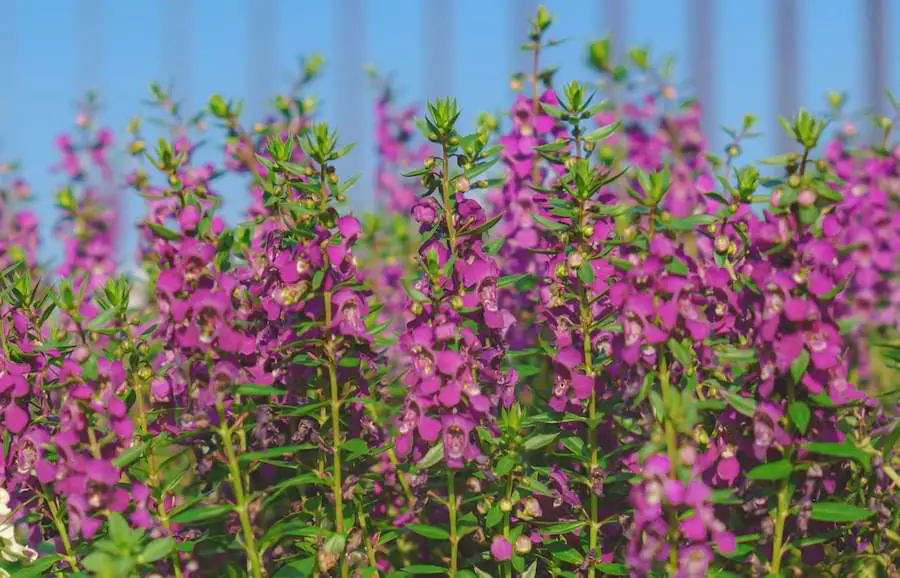
Even more companion plants for roses
Other companion plants and herbs for roses you can consider include: Thyme, parsley, Par Rue, Feverfew, Culinary sage, and Anise-hyssop which all discourage pests. Foxgloves to mingle with your roses. Azaleas go great with red roses. Or try pincushions and alliums too.
You can check out roses and azaleas in more detail as rose companion plants.
There are some flowers and plants you need to avoid too…
What NOT to plant with roses
There are naturally some plants you want to avoid using with roses. Typically these will be plants that grow taller than your roses and block out the light. Those that steal water, or plants that are generally invasive. Some also need shade or different soil pH.
Plants to avoid growing with roses include Echinacea, Fuchsia, Cosmos, Toad lilies, Bunchberry, and Leopard plants. Avoid large shrubs and trees, and do not plant too close as roses need some space to stretch out their limbs.
I’ll also single out cosmos in particular here as it’s one that springs to mind as being one to avoid for me.
Cosmos
The cosmos plant is very much an aphid magnet. So they will attract a lot of aphid interest. This may help keep aphids away from your roses, but I’d be more inclined to keep cosmos well away from your roses instead.
They would otherwise be a good companion for roses because they attract pollinators and help to prevent mildew _ and they’re pretty too.
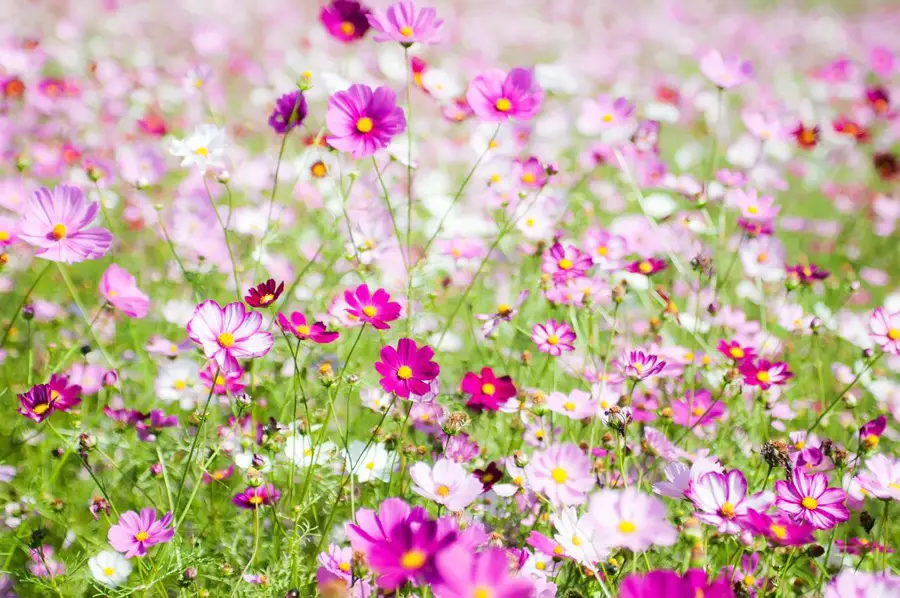
Companion plants for roses ~ More roses help! 🌹
These are just a few of the best companion plants for roses. There are many others that would also make great additions to your rose garden. You can experiment too so give some a go. If it doesn’t work out then simply move and replace them.
Do some research and find out which companion plants would work best in your garden. With a little planning, you can create a beautiful and full array of color and fauna for your rose beds.
Be sure to check out my recommended tools and resources, as well as the related articles below.
Are Roses Evergreen? Which Types, Differences, Choosing, FAQ
Rose Categories, Modern, Old Garden, and Wild, Ultimate Guide
Check out my recent articles…
- The Meaning of Red Roses: Love, Lore, Relationships, and More
- Where Do Roses Grow? Locations, Climate, and Requirements
- My Knockout Roses Look Terrible! Here’s the Problem! [Fixed]
- Best Pots for Roses: Types, Pros, and Cons, Which Is Best
- Can Climbing Roses Grow in Shade? Yes, Grow These Two!

Hi, I’m Michael. My passion for roses was sparked a few years ago after visiting a dedicated community rose garden. So Rosehow.com represents my take, my learnings, and my help for anyone looking to grow, be proud of, and harvest roses.

